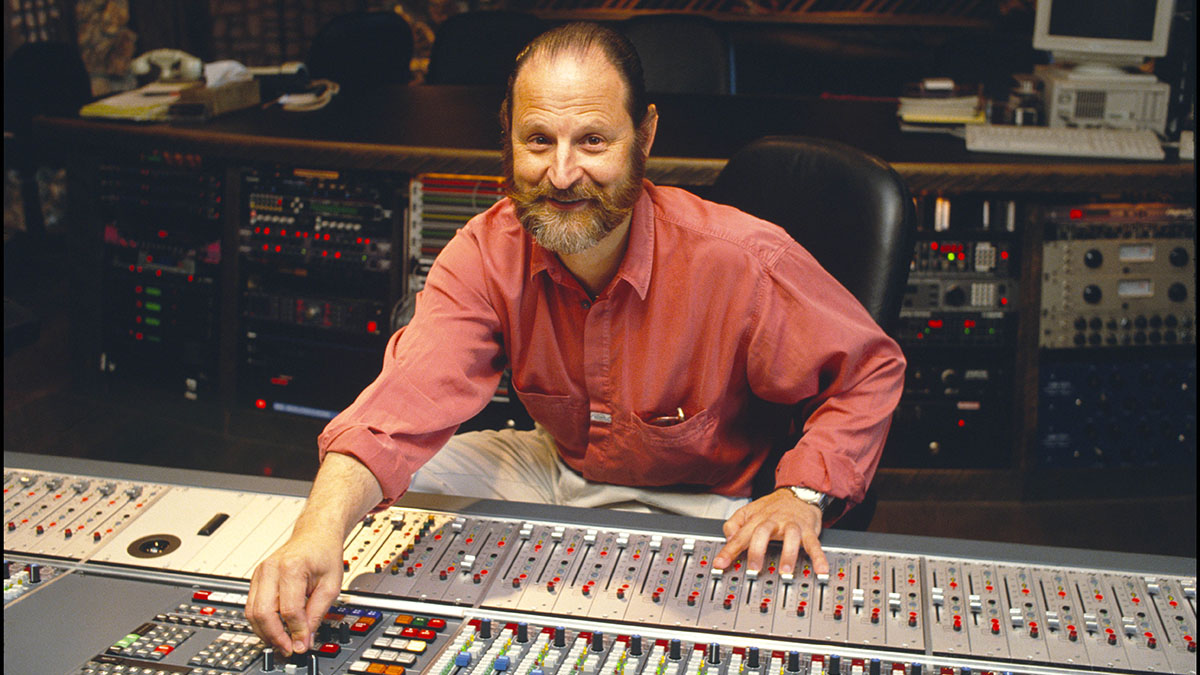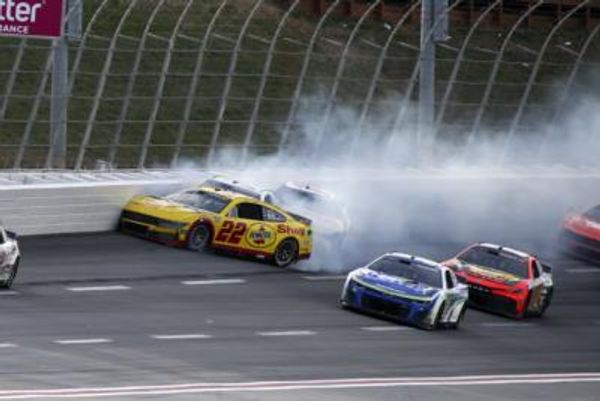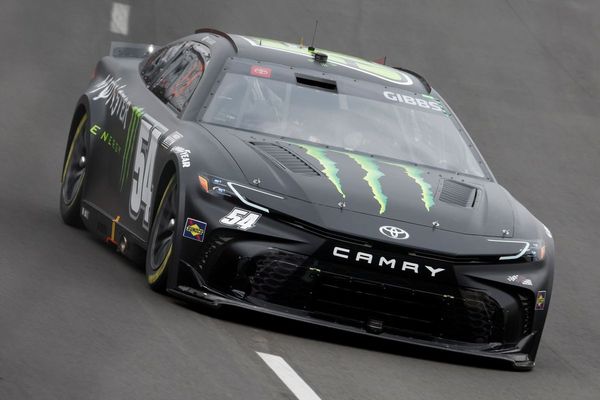
There have been more than a few notable producers and engineers who have impacted rock music over the years, including George Martin, Bob Ezrin, Tom Werman and Butch Vig. But few have specifically influenced rock music pertaining to the electric guitar in the way that South African-born knob-twirler extraordinaire Eddie Kramer has.
Even if you don’t know his name, you’ve undoubtedly heard Kramer’s work if you’re into the guitar-driven heroics of the late Sixties, Seventies and beyond. His resume boasts massive production and engineering credits on records like Jimi Hendrix’s Are You Experienced (1967), Led Zeppelin’s Led Zeppelin II (1969) and Kiss’s Alive! (1975).
Beyond those massive titles, Kramer’s discography features dozens of records created at the family New York City institution, Electric Lady Studios, which was commissioned by Hendrix and designed by Kramer and architect John Storyk.
So it goes without saying that Kramer has been as essential to guitar music as the players themselves. And to be sure, that association has left him with many favorites, but still, his iconic work with Jimi Hendrix stands out most.
“The backwards guitar on Are You Experienced was memorable,” Kramer tells Guitar World. “Jimi would take home tapes of the session, reverse it, practice to that and come back saying, ‘I know exactly where I want to play from here.’”
Elaborating on Hendrix’s process, Kramer says, “And then, bam, it was done. He knew what he had to do when I flipped the tape because he’d practiced it, which was an example of Jimi’s genius. And along with that, I will never forget the sheer beauty of Little Wing.
“It’s still one of the most emotional things I have ever heard. I could go on and on; all his stuff is bloody marvelous. But I guess some are more marvelous than others.”
The directive was, ‘Keep that damn thing rolling from the moment Jimi walks into the studio.’ You had to be ready whenever he plugged in because sometimes his first takes were so good that they’d smack you in the face
These days, despite being nearly 82, Kramer remains busy and tuned into what’s happening. But while he understands that advancement and digitization are inevitable, for Kramer, analog remains king.
“Nothing can substitute for analog,” he says. “It just sounds more pleasing to the ear. I know many things are done digitally, but it lacks warmth and soul. I think guitar players should think more analog; there’s just something about digital that rubs me the wrong way.”
Kramer still beams when talking about getting behind the glass and settling behind the boards. No matter where technology takes us, for as long as Kramer is around, the spirit of what made guitar music great will linger.
“I still get excited about this stuff,” he says. “Music has been such a big part of my life and still stimulates me. When I walk into a studio, I still get chills. There’s something about a bunch of musicians – or even one musician – getting in a room and striking that first chord. And when that happens, it all comes back, and I say, ‘Ah, yes, I know what to do with that.’”
Did you know from a young age that you wanted to be a producer and engineer?
“Growing up in South Africa, I was fascinated with the idea of, ‘What the hell is coming out of that speaker?’ I wanted to know how it got its power and volume and how it worked. I was just so curious, and I remember being young and sticking a screwdriver in a spot it shouldn’t go back in the days when the loudspeakers were powered by voltage. [Laughs]”
Once that fascination crept in, how did you view guitars within that space?
“It’s important to have perspective here because where I grew up, I studied music, but classical music was a massive part of my life. Understanding that allowed me to think outside the box and not be prejudiced by sound or a piece of music which was deemed offensive.
“My ears and mind were open when the Sixties came around, and I was recording a guy like the Kinks’ Dave Davies. But even then, this was before stereo recording, and the skill of working with mono was how we were taught, so by the time I got to Olympic Studios in ’66, and I was working with Jimi [Hendrix], my brain was on fire. I heard his guitar, and it completely changed my life.”
Nothing could have prepared you for witnessing Hendrix first-hand. Aside from having your mind blown, what went through your mind?
“To set the scene, it was January 1967, and [Hendrix manager and former Animals bassist] Chas Chandler had called me to book studio time as he and Jimi were unhappy with Hey Joe, The Wind Cries Mary and a few other tracks that were to be on Are You Experienced. The record was not finished, but they had heard that Olympic was a top studio, and they wanted to come down. So Jimi walks in, and I see these big amps coming in behind him.
“As that’s all sorted out, Jimi is sitting quietly in the corner, wrapped in a raincoat. He wasn’t saying a bloody word, but once the amp was set up, he wandered over, switched it on, plugged in his guitar, and just as I was setting the mic up, he started playing, and man, my brain froze. In that second, my life changed. I heard that sound, and I don’t know how to describe it other than God himself being in the room.”
Was it difficult to capture the enormity of that on tape?
“It was so remarkable and overwhelming. I had to think rather quickly about how I would record him, and I picked microphones that gave us the best shot of capturing the enormity of that sound. And then I said to Jimi, ‘I’m going to go to the control room and have a listen,’ and he looked at me, grinned, and said, ‘Okay…’
“And then, Jimi began tweaking his pedals, guitar and amp; all the while I’m frantically twiddling knobs, trying to keep up with him. In the end, we worked our asses off together, but we had so many laughs. Jimi knew I was trying to give him what he wanted and that I could give him a huge palette to work from.”
Did Jimi’s off-the-cuff nature as a soloist present much of a challenge for you?
“The trick was never to have a moment where the tape wasn’t running. I had total control over that, and the directive was, ‘Keep that damn thing rolling from the moment Jimi walks into the studio.’ You had to be ready whenever he plugged in because sometimes his first takes were so good that they’d smack you in the face.”
In hindsight, what was the most significant difference between working with Jimi and other guitarists?
“There was no separation between what he physically played and what his brain and soul were telling him to play. Those things were deeply interconnected as one piece, meaning the brain, heart, hands and fingers, so it was complete and utter expression. And then his sound had this unique technical quality that defied imagination.
“I often wondered, ‘How the hell did he do that? How did he make it sound so gorgeous yet aggressive?’ I heard so many magnificent things from him while sitting in the control room, but I’d still be amazed by what he could pull off.”
Is there one song or solo that stands out?
“All of them were brilliant in their own ways. But my favorite is Little Wing, which goes from beautiful tones created with the volume knob, getting this lovely, sweet sound before roaring into the solo. That dynamic shift is something to behold. It’s magnificent to the point that it’s overwhelming and incredibly emotional. But all of Jimi’s songs feature different levels of brilliance.”
And there’s Jimmy Page; how did you first meet him?
“Well, that’s a whole different ball game. A very interesting one. I met him… you know, we mentioned The Kinks in ‘63, ‘64, and I think on that song, You Really Got Me – either You Really Got Me or one of the others – I remember seeing Jimmy Page come in and doing an overdub.
“Now there is some contention about that, but that’s how I remember it. I was an assistant engineer in those days, but he was the guy. You know, you bring in this young, amazing guitar player or session guy – 17 or 18 years old or something, I don't know – but damn, he was good.”
You ended up in the studio with Jimmy for Led Zeppelin II, but were you a fan of their first album?
“It’s funny because, by 1968, I had gone to America and was working at the Record Plant. But I called John Paul Jones to catch up during a visit back in England, and he said, ‘Come over. I want to play you something.’ So I went to his house, and he played me the acetates of the first album, saying, ‘This is the band I’ve been working with.’ I couldn’t believe my ears and said, ‘What is this? It’s amazing.’
“So John said, ‘We’re called Led Zeppelin.’ I thought that was the worst name I’d ever heard. I thought, ‘Man, how could you be so stupid and wrong?’ But they got it right, and that first record was amazing. And later, in ’69, while I was getting going at Electric Lady Studios, I got a phone call from Jimmy Page, saying, ‘Do you want to work on an album with us?’ I said, ‘Absolutely.’ They brought in the tapes from England, and off we went.”
Jimmy is something of a studio wizard himself. What was it like matching wits with him?
“The cool thing was that I’d set up the mics how I did it, and Jimmy would listen and say, ‘Yeah, great.’ There was never a point of contention. It was an exchange of ideas and a lot of give and take. I appreciated that Jimmy knew what he was looking for, and he knew I could get the take and make it sound good. While we were mixing Led Zeppelin II, like with Jimi Hendrix, we laughed a lot and created a lot of great sounds. We had a very compatible relationship.”
Seeing how diverse Zeppelin’s Seventies records are, it seems the atmosphere didn’t change after they became kings of the world.
“The magic word there is ‘diverse.’ I loved the fact that Page was able to play acoustically so beautifully. And here’s the thing: dynamics is a huge part of what Zeppelin did, you know? All the greats, like [Frank] Zappa, Hendrix or whoever, understand that dynamics within music are important. They would bring the music down low and then come back slamming. I love that, and Page was an expert at that. So was John Paul Jones. It wouldn’t have been the same experience in the studio without both of those guys.”
Can you pick out a solo or moment from Jimmy Page as a favorite?
“Led Zeppelin II stands out for me because of the guitar work. Every album they did was magnificent, but I have a special place in my heart for Zeppelin II. The dynamics and the fact that we created some things through panning and using frequencies to create a vibe make it special. But I also must call out the live record; The Song Remains the Same, which was done under some challenging circumstances but did a great job of reflecting their energy and interaction on stage.”
Regarding live records, your work on Kiss’s Alive! changed the band’s trajectory. Working with a young band like Kiss must have been very different from working with Zeppelin.
“The thing with Kiss was we knew we had to get everything down on tape no matter what it took. It was hard because they were always jumping around, and we had to do a bunch of work on the album after the fact, but that’s how it was. The band may deny it, but the fact remains that on Alive!, we had to fix a bunch of stuff.”
Did anyone in the band have a say in those fixes?
“They did. And the album came out bloody great because the guys in Kiss were very particular about how it should sound and be mixed. We worked tirelessly for weeks to make Alive! sound amazing. So, while it’s not totally ‘live,’ it’s a great creation of the live sound of Kiss from that time.
“There were just bits we had to fix for obvious reasons, like the guys being on stage in six-inch boots, bombs going off and rockets and flames shooting to God knows where. [Laughs] It takes a lot of work to keep in time and tune while jumping up and down. They can do it now, but in those days, not so much.”
Right from the beginning, I knew that Ace Frehley would be a star – that’s for sure
It goes without saying that Paul Stanley and Ace Frehley were rough around the edges then, but could you tell they were stars in the making?
“Right from the beginning, I knew that Ace Frehley would be a star – that’s for sure. Ace had intuitive talents; he could play blues and rock, and I loved that he could play all these cool blues licks but make them his own. Ace wasn’t scared of anything.
“As for Paul, I thought he was good. He was an okay guitar player then but became very good later. Paul got sharper and steadier as a rhythm player. But Ace had this huge sound from the start, and his talent was instantly recognizable.”
You had the Midas touch with Ace, as you also got great results from him during his solo career. What was your secret?
“Ace is interesting because many interesting things go on in his brain, but you must get him in the right mood to get that cool stuff out. I remember working with him on his ’78 solo record, and I had to have him lie on the floor with a pillow behind his head and a bottle of Heineken because he was too nervous to stand up.
“So I’d have him on the floor with a bottle of whatever to calm him, and the more takes we did, the more confident he got. By the second or third take, he was up on his feet, and I said, ‘Alright, Ace, keep going. It’s cool.’”
It’s important to have pure tone from the room that’s resonating and sounds like it’s alive instead of being shut down by excessive limiting
What’s your tried-and-true technique for getting a good guitar sound, regardless of who you’re working with?
“You know, it’s different each time. But at the same time, there’s a principle involved in terms of where I put the microphones, what sound the guitarist is looking for, the tone of the guitar; I always want to make sure the sounds aren’t foreign, you know? I don’t want to be 180 degrees away from what the player is doing.
“If it’s an established player who has their specific tone, I’m not going to alter that with a bunch of crap. It’s important to have pure tone from the room that’s resonating and sounds like it’s alive instead of being shut down by excessive limiting. I give them whatever they need to make them happy. If the sound in the room isn’t great, I make it great.”
Looking back, you’ve immeasurably impacted the way listeners perceive rock guitar in recorded music. Could you have imagined as much when you first stepped into Electric Lady Studios?
“Thank you, I appreciate that. With Electric Lady, for me, when I first saw the space in ’69, I had heard they wanted to make it a nightclub, and I was like, ‘You’re out of your fucking minds. Let’s make this the best recording studio in the world for Jimi Hendrix.’ It became that and has repeatedly proved its point and is still living famously and beautifully. The sound of that room is special, and Jimi has blessed it with his spirit.
“I am so proud of Electric Lady; it’s a wonderful place to create music. It’s magical. It really is, man. I genuinely believe Jimi’s spirit is there because some of the stuff that comes together there… It’s been hard for me to find the same thing in other studios. I’m very proud of all I’ve done – especially the Electric Lady stuff. A few studios have a similar vibe, but nothing compares to the charm and mystery of Electric Lady.”







